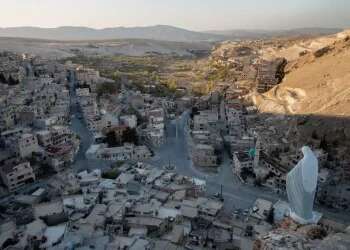The IDF held a first-of-its-kind joint training exercise this week at the cyber simulator at the Gidonim base at the Tzrifin military compound, where for 48 hours IDF cyber experts trained alongside their counterparts from the Cypriot and Greek militaries in an effort to boost cooperation and readiness for future crises.
Follow Israel Hayom on Facebook and Twitter
"We have the responsibility, as part of the national apparatus for defending the cyber dimension, to create an optimal defensive architecture," explained Lt. Col. A of the IDF's Computer Service Directorate. "Ultimately, contrary to other threats the IDF faces, cyber [attacks] will not come directly, rather in 99.9% of cases the threat will come from servers in countries across the globe. Hence there's a real need for anyone who is involved in defense to cultivate partnerships for a rainy day to curb threats against the State of Israel."
Relations with the Greek and Cypriot militaries are relatively strong, and two years an attempt to hold a similar drill was shelved due to the coronavirus pandemic. This week, however, as stated, 30 soldiers from the three armies tackled a multitude of scenarios over a two-day period.
"The objective was to let them get a sense of the [common] cyberspace and then intensify the pace of joint exercises. An [exercise] of this sort fosters strategic partnerships for us and every side understands the other side, which is critical in a future event. There's the old saying that 'the man in the tank will win the war.' Well, you also need the man behind the keyboard," said Lt. Col. A.
A future crisis, said Lt. Col. A, doesn't necessarily mean an attack of immense proportions, rather something along the lines of the ransomware attack on Hillel Yaffe Medical Center in Hadera in October.
"Unlike the physical world and the need to maneuver on land, for us, every day is crucial because every day there is friction. Is it possible that tomorrow morning I will use the connections I've now created to solve a problem in Israel? The answer is an unequivocal yes. If there's another incident similar to Hillel Yaffe, and we understand that the server [from where the attack came] is located in country X, our goal is to have a common language with them. We are creating a strategic connection and mutual commitments. When the next incident occurs, you want to have people and tools that can help you solve a problem in real-time," added Lt. Col. A.
As for land operations in the physical world, meanwhile, which have often been found lacking the few times the army has had to carry out large ground operations in enemy territory in recent years, the IDF on Thursday said it intends to significantly increase the amount of training for regular and reserve combat units over the course of 2022.
The army said it will invest hundreds of millions of shekels more than it did in 2021 to improve the battle-readiness of these forces, amounting overall to more than NIS 1 billion.
According to the IDF, in 2022 reservists will receive more training than they have since 2017, and 30% more than 2021 and 50% than 2020 – years in which the IDF was scrambling to cope with the coronavirus pandemic.
Subscribe to Israel Hayom's daily newsletter and never miss our top stories!




